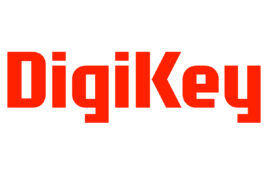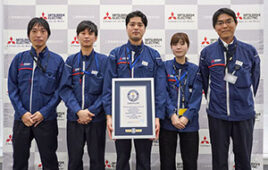
Felix Brockmeyer, the CEO of igus Inc., at the company’s 2024 Hannover Messe booth in Germany.
It can’t be easy being a plastics manufacturer these days, with a barrage of news reports about plastic particles being found on remote beaches or the seabed itself. But count on Rumford, R.I.-based igus Inc. to turn that story on its head, with some innovative ways that they’re using plastics to help the environment — not to mention recycling problematic plastic refuse like fishing nets into (of all things) bicycles.
I caught up at the recent Hannover Messe with Felix Brockmeyer, CEO of igus Inc., the North American company that touts “motion plastics” as a replacement for metal bearings, thus avoiding the need for grease and manual lubrication. (The parent company, igus GmbH, is based in Cologne, Germany.)
DW: Tell us about your RCYL bike. I know it began as sort of a pet product of Frank Blase, your global CEO, several years ago, but now it feel like a fully fleshed out product for you.
FB: It started very much as a fun project from Frank. Early on, we were told this isn’t really ever going to be anything, this is just an experiment. But over the years, it’s really turned into something that is more and more of a focus.
One day, Frank was on vacation in Florida riding a very rusty beach cruiser — he knew every two months he had to change the chain on it because it would snap if it wasn’t maintained. All the wheels were rusting. Everything was squeaking and he wondered, “What could we do with lubrication-free motion plastics here?” So, the idea was born to look into building a bicycle that needs no maintenance, cannot rust, and is fully recyclable. The material that we use to build the bike can be shredded and reused again, or partially built out of recycled plastic. We now have a single speed city cruiser / beach cruiser bike that we’ve launched. We’ve taken orders for it here in Europe. We’re delivering the first couple of hundred this this Spring and I believe we have pre-orders for about 3,000 bicycles.
Because we believe in the [online selling] platform idea around plastic bicycle components, we might not make everything — but maybe other manufacturers will become interested. If they want to incorporate bushings into their gear shifters and they want to have a high content of recyclable materials in their gear shifters, that will be a product they could put on there. If somebody has environmentally friendly tires, for example, we’d be happy to put that on that marketplace. We’re discussing a potential partnership with a tire manufacturer will mix solid tires almost like foam where you don’t need air. These types of partnerships with companies that believe in the maintenance free sustainable bicycle idea, we want to give access into that [resale] platform, too. Right now, we have the one bicycle designed and finished. It’s 92% made out of plastic. The only metal parts are the rotors on the brakes, the cabling, and the wires to activate the brakes and the fasteners.

A view of the RCYL at igus’ 2024 Hannover Messe booth.
Some of them are made out of virgin plastic, and some of them are made out of 50% recycled fishing nets or other recycled material. We’re striving to increase that recycling content over and over and over.
DW: Weren’t you just showing the bike in California? What did everyone think?
FB: We just showed it at the Sea Otter Classic bike festival in Monterey, California. And everybody loves the idea of a recycled bicycle — ideally, made out of materials that are, in this case. recycled waste — to reduce the dependency and supply chain dependency on Taiwan, where more or less all bicycle parts are made.
DW: I noticed a focus on handlebars for the bike. Can you explain that component a bit?
FB: Every single bicycle handlebar comes out of a factory in Taiwan unless it’s some artesian or titanium shop that makes it handmade. When the first company really attains high volume production outside of Taiwan and China, there will be a lot of interest from the OEMs. We want to have risk mitigation opportunities on the dependency of China and Taiwan. That will develop, but the entire industry depends on Taiwan as a manufacturer today.
DW: These types of bikes seem perfect for hotels or bike sharing programs.
FB: Exactly. And as the population grows in lower income countries, as mobility grows, things will change — e-bikes in Asia are already replacing the traditional old scooters. If you think about Africa, South America, even Eastern Europe, the trend of bicycling will only increase. We could imagine a whole mobility concept that we can scale. So today it might be a bicycle. Maybe one day, it’s a four-wheeler or a four-wheeled cargo bike that we can make out of plastic components.

Part of igus’ booth at Hannover Messe 2024.
DW: You’ve now been with igus about a year and a half. What have you learned thus far?
FB: The biggest takeaway for me is that igus has a tremendous speed but also a tremendous potential. It’s probably the most dynamic company I’ve ever dealt with when it comes to solving customers problems and pivoting to address trends that we see in the market or customer needs. Everybody focuses on solving the customer’s pain points and we have little internal hierarchy structures. That means decisions flow really fast, problems get solved really fast, communication is fast. You can get things implemented really quickly.
We have a significant market potential in the U.S. We now can mold products in the U.S.; we expanded into a molding facility in Rhode Island, and it gives us a huge speed advantage to the market. For other companies in the U.S., I see them reducing headcounts, but igus has 40 open positions — and we’re a company that is willing to invest even when sales are flat, because we believe in that tremendous potential.
DW: More than most multinational companies I know, there seems to be a great camaraderie between the Americans and Germans. Can you talk about that dynamic, as well as your personal leadership style?
FB: You’re absolutely right, igus is like a tremendous network of friends. That comes from the top down. Our owner cares about every single employee we have and that trickles through the leadership. It is a very welcoming environment; that there’s no hierarchy helps tremendously.
I was a VP at my former company, and [we executives] sat in an office and the others did the work — and I did not like that. I like to be involved in the work. I like to try things out. I like to go to a trade show and work it, because I want to hear what customers truly say and if our somewhat grandiose ideas really work. I think being part of the team in the trenches motivates a lot of others.
We practice the principle of servant leadership, where you lead by example; you’re not better than anybody else. We all get treated equally. You all wear the same clothes. We all have the same company cars if we have any. There is no hierarchy level, no offices.
This opens the door for very fast feedback. When employees see something wrong or have an idea of how something could work better, it’s easy to approach us because we’re sitting right there. People walk by our cubicles, and it doesn’t take as much courage to say “Hey, Felix, I observed this one product always have problems here …”
As we’re based in Rhode Island, I noticed there wasn’t a lot of communication to the team. Not everybody knew [big picture things]. Where does the company want to go? And how are we doing as a company? So, I implemented quarterly townhall meetings where we inform the entire organization, from assembly staff to CEO. What are we working on? Who are these mysterious salespeople that are running around in the world somewhere? What do our customers say? And what are the numbers looking like and what do we expect for the next quarter or six months?
Filed Under: NEWS • PROFILES • EDITORIALS




